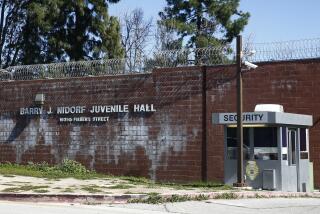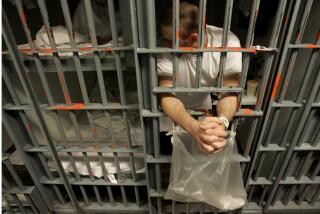L.A. County creates Prop. 47 task forces to help ex-offenders
Los Angeles County officials voted Tuesday to set up two task forces aimed at helping residents convicted of felonies that are now eligible for reduction to misdemeanors under California’s Proposition 47.
The ballot measure passed by California voters last year reduces some drug possession and property crimes from felonies to misdemeanors. People who have already been convicted of felonies under the old rules can get their convictions reduced.
One county-convened task force, made up of officials from local criminal justice and social service agencies, will look at how many county residents already have applied for reclassification and plan for reaching eligible offenders who have not yet done so. The deadline to apply for downgrading of charges in most cases is November 2017.
Los Angeles County Public Defender Ron Brown said his office so far has handled about 16,700 petitions that succeeded in reducing clients’ charges under Proposition 47.
A second task force, mainly made up of county officials and business and labor groups, will be asked to consider ways to get ex-offenders into job training programs and connect them with other services. The group also will include two people who have spent time in jail or struggled with homelessness, substance abuse or mental health issues.
Supervisor Hilda Solis, who proposed the programs along with Mark Ridley-Thomas, said the county should “build a pipeline from prison to productive citizenship.”
“These men and women come out of jail and find themselves homeless, untreated, and many of them unemployed,” she said.
Proposition 47’s proponents point to reduced jail and prison populations as a sign of the measure’s success. They say it will save the state and counties money and shift focus from penalizing to rehabilitating offenders.
Critics, including Los Angeles County Sheriff Jim McDonnell, blame the measure, in part, for rising crime rates in the county. They say it’s difficult to get low-level offenders to engage in diversion programs that offer drug and mental health treatment without the hammer of potential prison time.
Supervisor Michael D. Antonovich echoed those concerns despite voting for the task force. He said offenders “are not easily inclined to go to rehabilitative programs on a voluntary basis.”
Criminal justice advocates and people whose crimes were reduced under the proposition disagreed.
Ingrid Archie, 34, said she was released from prison in August as a result of Proposition 47 and has since found a job working as night staff at a homeless shelter. She said she is receiving family reunification services to regain custody of her children and has enrolled in school.
“If we are provided the resources, we will take advantage of them,” she said. “It’s a second chance for us, and we are willing to take advantage of it.”
John Kim, executive director of the California office of the Advancement Project, a civil rights advocacy group, called the supervisors’ action “an important tipping point” in the county’s approach to criminal justice.
“We’ve seen incarcerations used to manage poverty, we’ve seen incarceration used to manage dependency, to manage mental illness,” he said. “Voters are looking for a new day in L.A. County.”
In addition to creating the task forces, the supervisors voted to pursue more state funding for services to the ex-offenders and to commission a review by the county auditor-controller of potential cost savings resulting from Proposition 47.
Twitter: @sewella
More to Read
Sign up for Essential California
The most important California stories and recommendations in your inbox every morning.
You may occasionally receive promotional content from the Los Angeles Times.











